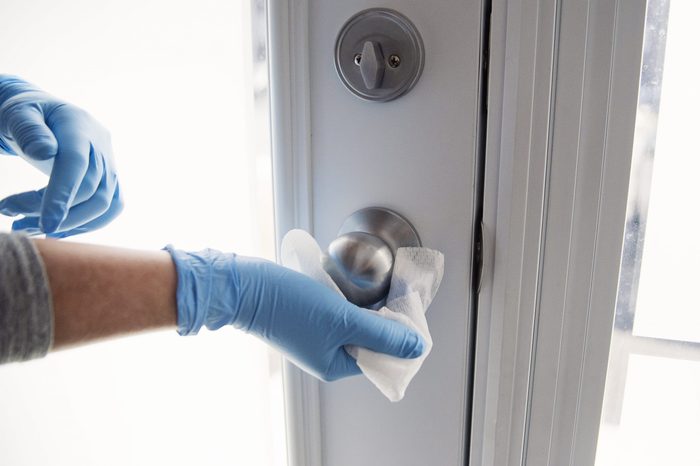
Disinfecting vs. cleaning
Social distancing and sheltering in place are important tools to help flatten the curve and reduce the spread of COVID-19. Disinfecting and cleaning anything that enters your home from the outside world—including yourself—is also paramount.
Scientists and the medical community are still discovering the various ways in which COVID-19 can be transmitted, but they all seem to agree that proper hygiene is an important step in the fight. What does that mean when it comes to cleaning the items you bring into your home?
“One of the challenges we have is that there is a lot of baseline information about the particular virus that causes COVID-19, SARS CoV-2, but very little basic research has been performed to determine how long it can survive on surfaces,” says Meghan A. May, MS, PhD, a professor of microbiology and infectious diseases at the University of New England College of Osteopathic Medicine. “The good news is that SARS CoV-2 is highly susceptible to many disinfectants, including alcohol-based sprays or gels, ammonium compounds, detergents, bleach-based cleaners, and heat.”
The Centers for Disease Control and Prevention (CDC) reports, “cleaning of visibly dirty surfaces followed by disinfection is a best practise measure for prevention of COVID-19 and other viral respiratory illnesses in households and community settings.” So, what’s the difference? Cleaning refers to the removal of germs, dirt and other impurities from surfaces—this does not kill germs, but rather it helps reduce numbers and the risk of spreading infection. Disinfecting refers to using chemical disinfectants registered by the Government of Canada to kill germs on surfaces. Since many cleaners and disinfectants are harsh on the skin, it’s wise to wear disposable gloves when cleaning with both items. Be sure to discard the gloves after each use and immediately wash your hands.
“When reaching for an antimicrobial cleaning product, it’s important to consider that optimal effectiveness of disinfectants—typically a 99.9 percent reduction in particular pathogens—will only be achieved when used according to the label instructions,” warns Samara Geller, senior research and database analyst for the Environmental Working Group (EWG). “Too often, one or more key disinfection factors are overlooked by the user.” These are the household products that kill coronavirus, according to Consumer Reports.
Here’s everything you need to think about the moment you arrive back home from an outing.
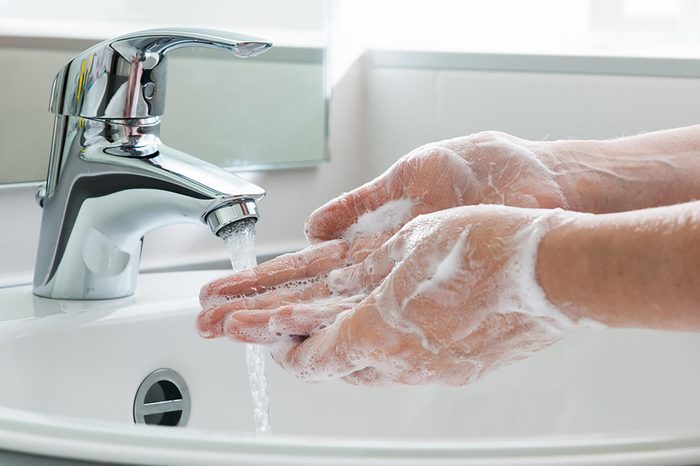
Hands
Wash your hands. Soap and water should always be your first choice. If not available, choose an alcohol-based sanitizer with at least 60 percent isopropyl alcohol. Scrub thoroughly for at least 20 seconds, washing the front and back of your hands and fingers, between your fingers, and the fingernails (including underneath long nails). “You do not need to use antibacterial soap, nor do you have to use hot water,” says Elizabeth Mullans, MD, a board-certified dermatologist and founder of Uptown Dermatology in Houston, Texas. “Do not touch your eyes, nose, or mouth until you have clean hands.” You will need to wash your hands again when you’re done unloading groceries or handling anything else you brought in from outside. Just make sure you’re not making these common handwashing mistakes.

Cell phone
Try not to put your cell phone anywhere but your pocket or purse and especially not on grocery conveyor belts, shelves, carts, and payment counters. The less exposure to public surfaces, the better. When you return home, Dr. Mullans says to use disinfecting wipes (such as Clorox, or alcohol-based wipes containing at least 70 percent isopropyl alcohol). “Make sure to wipe down the entire phone, including the screen,” she says. “Disinfect your phone at least once a day, even if you’re staying home, but more frequently if out and about.” (Here’s how to properly disinfect your cell phone.)
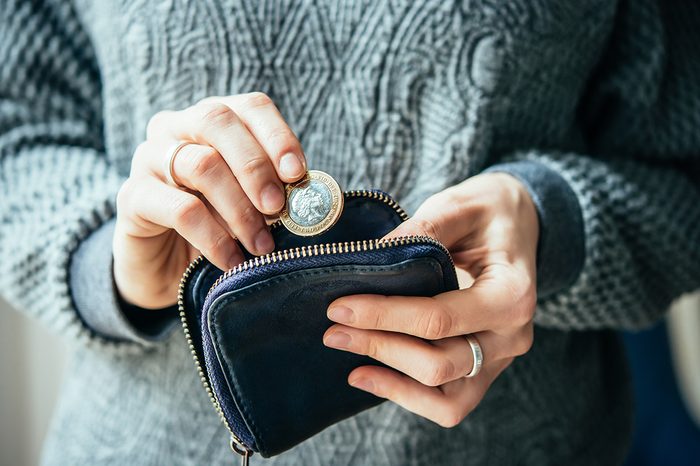
Wallet or purse
As with your phone, try to keep your purse or wallet on your person instead of throwing it in the shopping cart. Once back home, you’ll need to refer to the manufacturer’s instructions on how to clean your wallet or purse as it depends largely on the material. At the very least, keep these items off of kitchen tables and countertops and wash your hands every time you touch it.
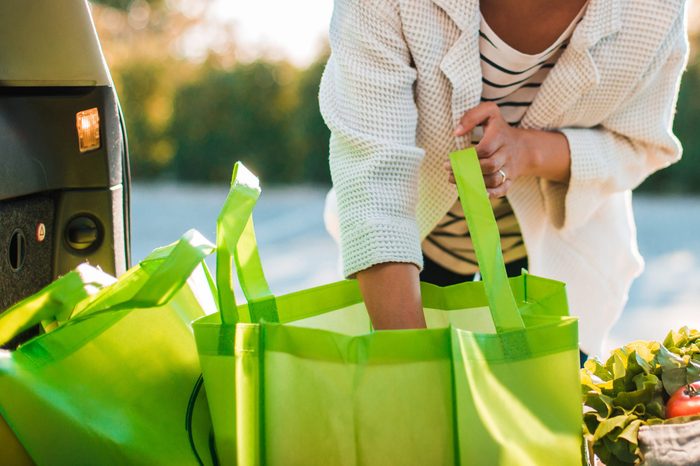
Grocery bags
While you may be in the habit of bringing your own bags to the grocery store in an effort to cut down on single-use plastic, now may not be the time to worry about environmental impact. “During the COVID-19 crisis, I recommend using the grocery bags supplied by grocery stores,” says Dr. Mullans. If you aren’t willing to give up your reusable bags, she suggests washing them in a washing machine or at least wiping them with disinfectant after each use. Also, whatever surface you put your grocery bags down on at home (hard non-porous surfaces like countertops, the floor, or table are easier to clean than rugs or carpet) should be disinfected thoroughly after they are clear. Dr. May says the virus can remain on paper bags for about 24 hours, so get these out of the house as soon as possible.
(Make the most of your next grocery trip and stock up on these foods that last for years.)
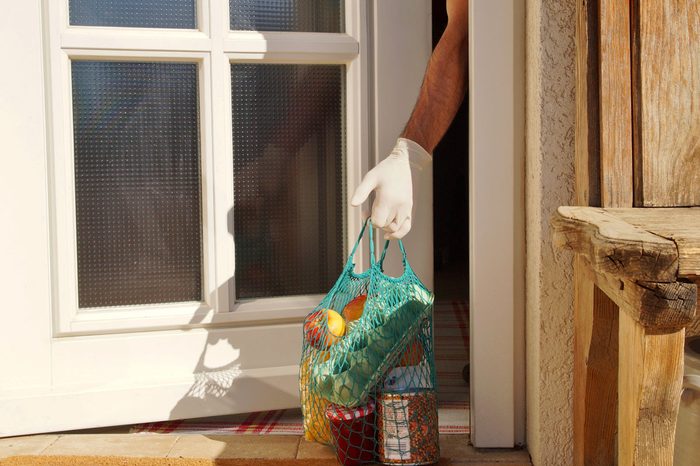
Purchased products
OK, the bags are out of the way, but what about everything you brought home that once lived on a store shelf? Disinfect everything you can within reason—but simply rinse your fruits and vegetables under running water; do not use bleach, soap or other disinfectants. Although there is no evidence that suggests food can transmit the virus, according to the Government of Canada, it is a good idea to disinfect your kitchen countertop after unloading cans, boxed goods, and other packaged products. Avoid touching your face during this process, and then wash your hands when you’re done.
(Tired of cooking? Find out the dos and don’ts of ordering from a restaurant.)
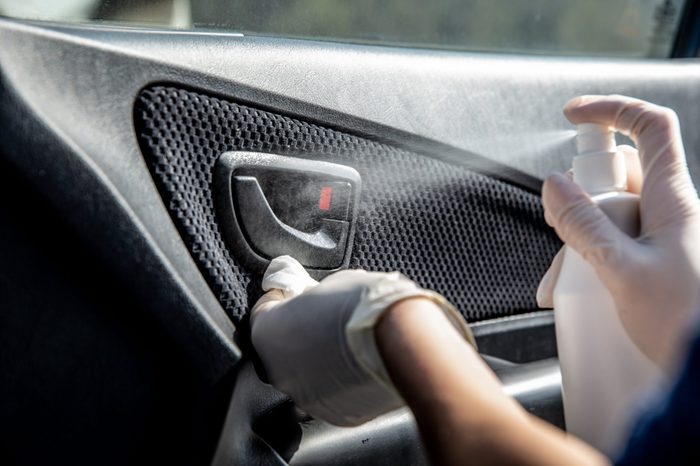
Car
Now, it’s time to head back out to your car and start retracing your steps a bit. The virus can live on a plastic steering wheel for about 75 hours and a car door for roughly 40 hours, Dr. May says. Aside from those items, when you left the store, you likely also touched your keys, seat belt, seat, gear shift, sun visor, touchscreen, trunk latch, garage door opener, and cup holders. Use disinfectant wipes on everything except leather and touchscreens.
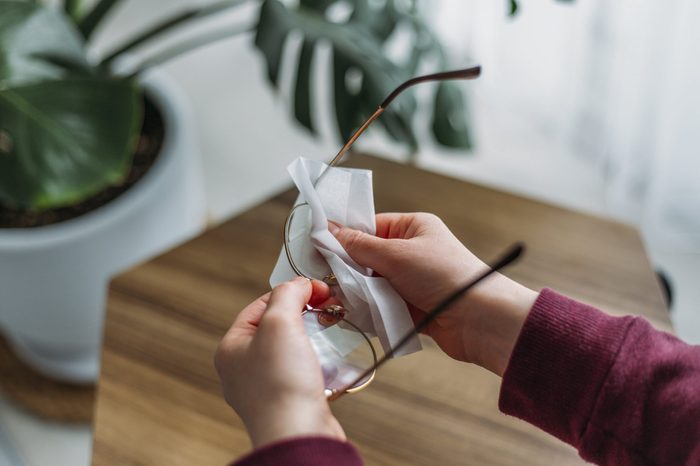
Spectacles and sunglasses
Dr. May says that the virus can survive approximately 75 hours on your eyeglasses or sunglasses. She suggests washing with soap and hot water upon returning home for the best disinfecting power, but you can also use an alcohol-based wipe on everything except the lenses for extra protection.
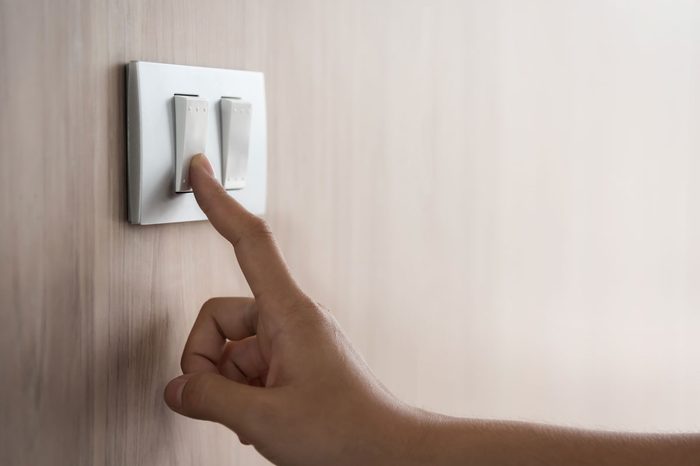
High-traffic touchpoints
On the way into the house from the car, how many things did you touch before washing your hands? Reflect on everything possible—such as the garage door opener, door handle, a light switch, an alarm system panel, a pet or child gate—and then start disinfecting each surface with sprays or wipes. Oh, and go wash your hands again. (Psst: Here are some of the most germ-infested objects you touch every day.)
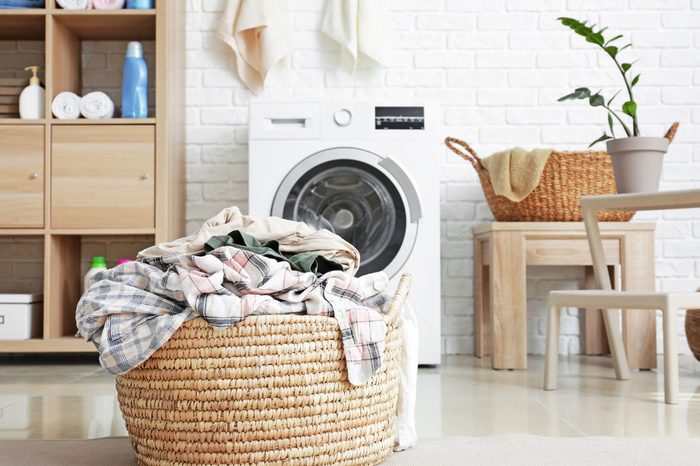
Clothes
Now, turn your attention toward yourself. Your clothes should go right into the washing machine (not just sitting around festering in a laundry hamper). “It is best to wash clothes in the washing machine on the warmest setting recommended by the manufacturer, and dry them on warmest setting recommended in the dryer,” says Dr. Mullans. “Regardless of the temperature, in addition to laundry detergent, I recommend adding bleach for white fabrics, towels, and sheets.” Whatever you do, don’t mix bleach and white vinegar. The CDC warns that shaking dirty laundry may disperse the virus through the air, so avoid too much movement. Wash your hands after handling dirty laundry.
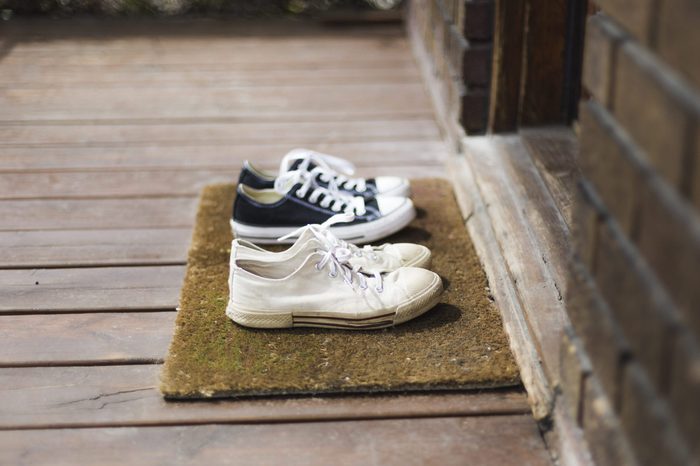
Shoes
Just as with your purse and wallet, shoes may be incredibly difficult to disinfect. If you happen to own a pair of machine-washable shoes, choose those for your outings and toss them in with your clothes after you return home. Otherwise, it may be a good idea to turn your house into a no-shoe zone for the time being—even before coronavirus came on the scene, there were half a dozen reasons why you should take off your shoes the minute you enter the house. Once it becomes a habit, you’ll never go back to your old ways.
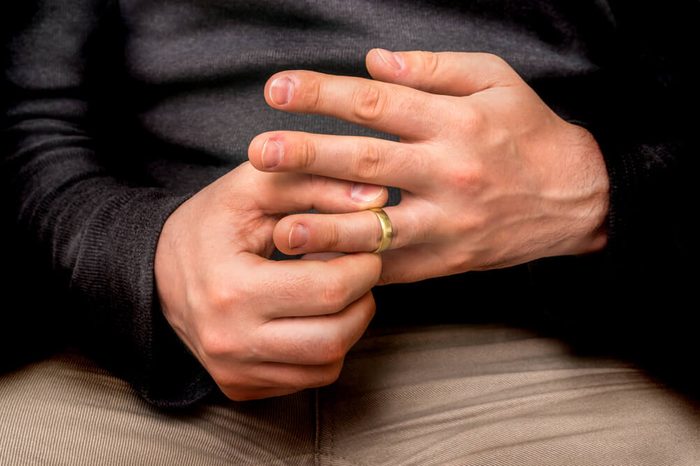
Jewellery
It’s important to keep your jewellery cleaner than ever, especially rings and bracelets. If it’s only getting cleaned during your normal hand-washing process, it may not be enough—germs can hide in crevices and between your skin and the metal. “Clean jewellery and gemstones according to instructions from the manufacturer,” says Dr. Mullans, who tries not to wear jewellery during the pandemic. Hard gemstones, such as diamonds, rubies, and sapphires can usually be cleaned with isopropyl alcohol, but double-check with your jeweller first.

Body
Now that everything you’ve touched is as disinfected as possible, time to think about how to cleanse your body. “Especially during the COVID-19 crisis, I recommend showering and washing hair, if possible,” says Dr. Mullans of returning home after running out for errands. “If the skin and hands become dry with more frequent washing and bathing, use moisturizer.”
And if you have any energy left after all of these post-outing cleaning steps, here are a few other activities to do while in quarantine.
